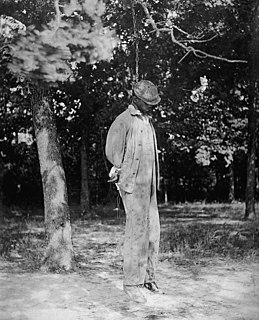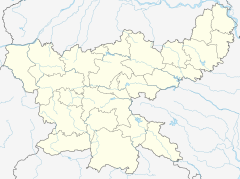
Lynching is an extrajudicial killing by a group. It is most often used to characterize informal public executions by a mob in order to punish an alleged transgressor, punish a convicted transgressor, or intimidate people. It can also be an extreme form of informal group social control, and it is often conducted with the display of a public spectacle for maximum intimidation. Instances of lynchings and similar mob violence can be found in every society.

Jharkhand is a state in eastern India. The state shares its border with the states of West Bengal to the east, Chhattisgarh to the west, Uttar Pradesh to the northwest, Bihar to the north and Odisha to the south. It has an area of 79,716 km2 (30,779 sq mi). It is the 15th largest state by area, and the 14th largest by population. Hindi is the official language of the state. The city of Ranchi is its capital and Dumka its sub-capital. The state is known for its waterfalls, hills and holy places; Baidyanath Dham, Parasnath, Dewri and Rajrappa are major religious sites. The state was formed in 2000, from the territory that had previously been part of Bihar.

Jamshedpur or Tatanagar is the largest and most populous city in Jharkhand and first planned industrial city in India. It was ranked as the cleanest city of India in the year 2019.

East Singhbhum is one of the 24 districts of Jharkhand, India. It was created on 16 January 1990. More than 50% of the district is covered by dense forests and mountains, where wild animals once roamed freely. It is known for being a centre of industry since Jamshedpur, the most populous city in Jharkhand, is located here.
Chaibasa is a town and a municipality in West Singhbhum district in the state of Jharkhand, India. Chaibasa is the district headquarters of West Singhbhum district. It is also the headquarter of Singhbhum Kolhan division headed by the Divisional commissioner. It is famous as a mining hub as well as for being the hometown of Birsa Munda, Jharkhand's most well known freedom fighter.

Singhbhum was a district of India during the British Raj, part of the Chota Nagpur Division of the Bengal Presidency. It was located in the present-day Indian state of Jharkhand. Chaibasa was the district headquarters. Located in the southern limit of the Chota Nagpur Plateau, Singhbhum included the Kolhan estate located in its southeastern part. The district has been divided into three smaller districts, being East Singhbhum, West Singhbhum and Saraikela Kharsawan all are present in Jharkhand state of India. This district of Jharkhand is one of the leading producer of copper in India.
Chandil is a census town in the Chandil CD block in the Chandil subdivision of Seraikela Kharsawan district in the state of Jharkhand, India.
2016 Jharkhand mob lynching refers to the case of lynching of two Muslim cattle traders by allegedly cattle-protecting vigilantes in Balumath forests of Latehar district in the Indian state of Jharkhand on 18 March 2016. The attackers killed 32 year old Mazlum Ansari and 12 year old Imtiaz Khan who were both found hanging from a tree.
In July 2016, seven members of a Dalit family were assaulted by a group of people in pretext of cow protection in Una in Gujarat, India. The video of the incident was circulated on the social media resulting in statewide protests in following months. Forty-three people including four police officers were arrested and the case is under trial since August 2018.

The 2017 Alwar mob lynching was the attack and murder of Pehlu Khan, a dairy farmer from Nuh district of Haryana, allegedly by a group of 200 cow vigilantes affiliated with right-wing Hindutva groups in Alwar, Rajasthan, India. Six others who were with Pehlu Khan were also beaten by the cow vigilantes.
In India, cow vigilante violence is the use of physical force in the name of "cow protection". Since 2014, mob attacks targeting mostly illegal cow smugglers, but in some cases even licensed cow traders, have become prominent. There is a debate on whether there has actually been any change in the number of such incidences, as Government Data points out to reduced communal tensions post 2014. Cattle slaughter is banned in most states of India. Recently emerged cow vigilante groups, claiming to be protecting cattle, have been violent leading to a number of deaths. Cow-protection groups see themselves as preventing cattle theft and smuggling, protecting the cow or upholding the law in an Indian state which bans cow slaughter. According to a Reuters report, a total of 63 cow vigilante attacks had occurred in India between 2010 and mid 2017, most after Prime Minister Narendra Modi came to power in 2014. In these attacks between 2010 and June 2017, "28 Indians – 24 of them Muslims – were killed and 124 injured", states the Reuter's report.

The 2017 Nowhatta mob lynching, was the lynch mob murder and mutilation of an on-duty undercover Indian Police officer in J&K Muhammad Ayub Pandith, on the Muslim holy night of Laylat al-Qadr on Thursday 22 June 2017 by a mob in Nowhatta after a crowd shouted slogans in favor of Pakistan as well as al-Qaida jihadist Zakir Musa. Sajjad Ahmad Gilkar, a Hizbul Mujahideen militant, had played a key role in the lynching according to the state police.
The Indian WhatsApp lynchings are a spate of mob-related violence and killings following the spread of rumours, primarily relating to child-abduction and organ harvesting, via the WhatsApp message service. The spate of lynchings commenced in May 2017 with the killing of seven men in Jharkhand, but did not become a matter of national attention until the beginning of the following year. Fake messages customised with locally specific details are circulated along with real videos attached to fake messages or claims.
On 17 June 2019, 24-year-old Tabrez Ansari was attacked by a lynch mob in Jharkhand, India. Ansari, a Muslim, was tied to a tree, brutally beaten and forced to chant Hindu religious slogans. He died four days later. The incident came to light after a video of the lynching went viral. The attackers accused him of bike theft. India's Prime Minister commented on this lynching in the Parliament of India.

Chaibasa Engineering College is a technical undergraduate college focused on the tertiary study of engineering and natural sciences, located near Chaibasa town in the West Singhbhum district in the Kolhan division of India.
On 16 April 2020, a vigilante group lynched two Hindu Sadhus and their driver in Gadchinchale Village, Palghar District, Maharashtra, India. The incident was fuelled by WhatsApp rumours of thieves operating in the area during the countrywide coronavirus lockdown. The vigilante group of villagers had mistaken the three passengers as thieves and killed them. Policemen who intervened were also attacked; four policemen and a senior police officer were injured.

Chandil block is a CD block that forms an administrative division in the Chandil subdivision of Seraikela Kharsawan district, in the Indian state of Jharkhand.
Adityapur block is a CD block that forms an administrative division in the Seraikela Sadar subdivision of Seraikela Kharsawan district, in the Indian state of Jharkhand.

Dhalbhum subdivision is an administrative subdivision of the East Singhbhum district in the Kolhan division in the state of Jharkhand, India.











